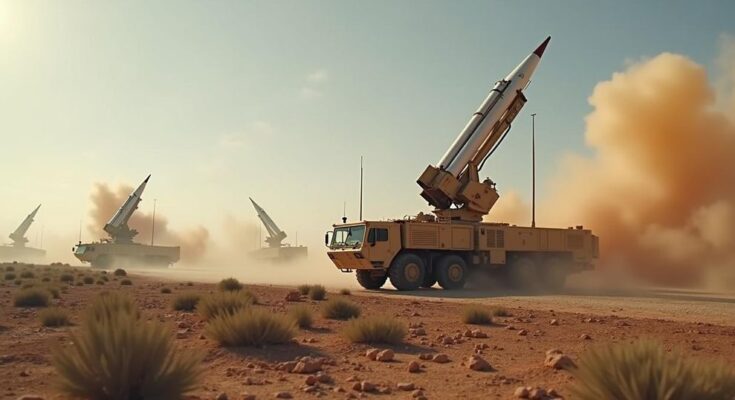The recent escalation in the Israel-Hezbollah conflict saw a drone attack by Hezbollah that killed four Israeli soldiers, coinciding with the U.S. announcement of deploying a THAAD missile battery to Israel. Netanyahu has demanded the withdrawal of UN peacekeepers from southern Lebanon, while the UN warned of potential war crimes due to attacks on peacekeepers. Israeli airstrikes in Gaza continue to yield significant civilian casualties, with calls for international support against Iranian threats growing louder.
The escalating conflict between Israel and Hezbollah recently intensified with a drone assault that claimed the lives of four Israeli soldiers and injured several others. This assault occurred hours after the United States announced the deployment of a Terminal High Altitude Area Defense (THAAD) missile battery to Israel, accompanied by troops to support its operation. The Pentagon emphasized that this deployment reflects the unwavering commitment of the United States to defend Israel and American personnel in the region against potential ballistic missile threats posed by Iran. The drone strike undertaken by Hezbollah was characterized as a retaliatory action for Israeli airstrikes in Beirut, which resulted in numerous civilian casualties. Concurrently, Israeli Prime Minister Benjamin Netanyahu called for the immediate withdrawal of UN peacekeeping forces from southern Lebanon, stating that continued presence in areas adjacent to Hezbollah might jeopardize their safety and inadvertently support militant activities. To this end, the United Nations has issued a warning that attacks against peacekeepers could classify as war crimes following five peacekeepers sustaining injuries from Israeli gunfire. Additionally, continued Israeli airstrikes in Gaza have resulted in substantial civilian casualties, including a recent strike that claimed the lives of 20 individuals at a school sheltering displaced people. Israel maintains that its military operations are aimed at militant targets and cites the operational complexities due to the dense population in Gaza. Amidst this turmoil, an Israeli soldier brought attention to the necessity of international support against perceived threats from Iran, urging nations, particularly the UK, to take a firmer stance reminiscent of Winston Churchill’s leadership during WWII. The ongoing situation demands careful scrutiny and deliberation among international actors as the humanitarian implications of the conflict escalate.
The history of conflict between Israel and Lebanon, particularly involving the militant group Hezbollah and influences from Iran, represents a complex interplay of military actions and diplomatic tensions. Amidst the backdrop of the recent hostilities, the presence of UN peacekeeping forces serves as a stabilizing factor, although their role is increasingly challenged by ongoing violence. The strategic positioning of military assets by both Israel and the United States reflects longstanding efforts to counter perceived threats from regional adversaries. Furthermore, the humanitarian crises stemming from military operations, especially in Gaza, invite global calls for peace and protective measures for civilian populations.
In conclusion, the conflict between Israel and Hezbollah continues to escalate, marked by retaliatory attacks and significant military engagements. The U.S. deployment of the THAAD missile system signifies a profound commitment to Israel’s defense as tensions with Iran persist. The international community, represented by the UN, faces critical challenges to uphold peace amid potential war crimes as hostilities disrupt civilian life in both Gaza and Lebanon. Ongoing efforts to stabilize the region will be essential to mitigate humanitarian repercussions and restore a measure of peace.
Original Source: www.independent.co.uk




